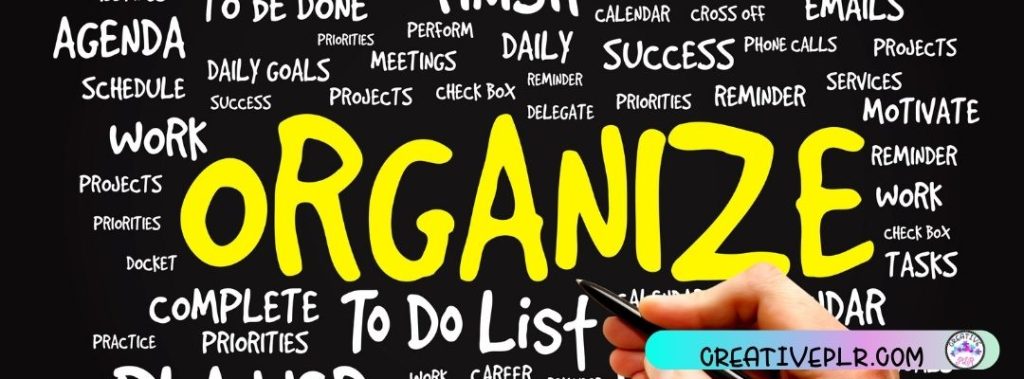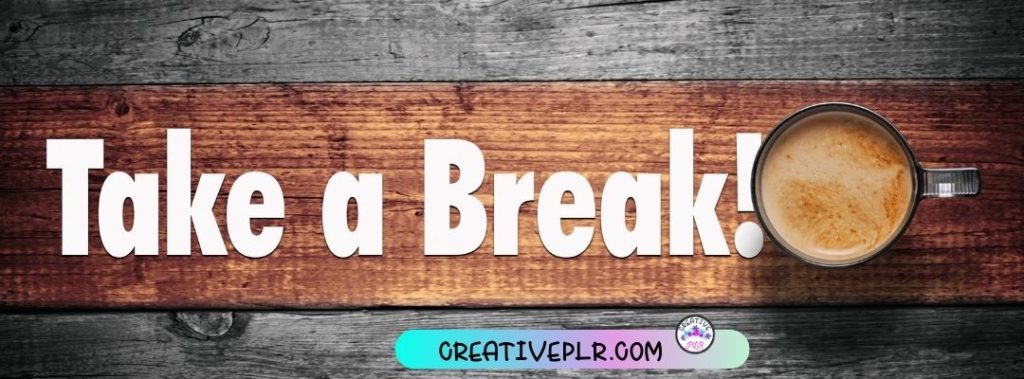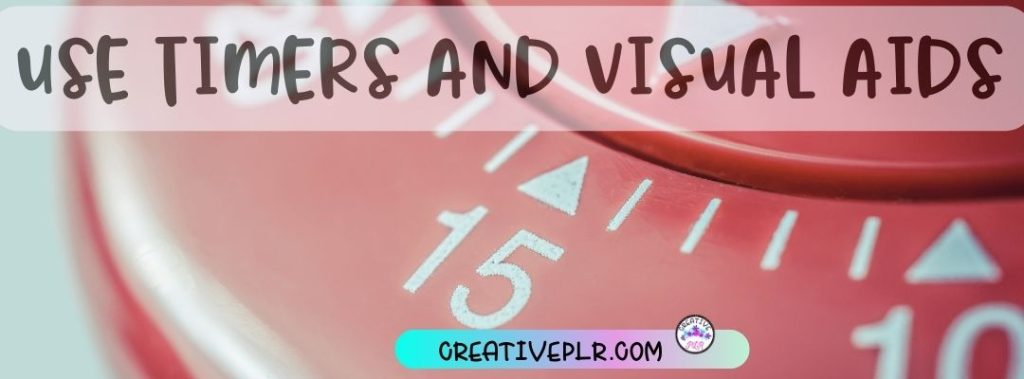Daily distractions not only reduce focus, increase stress but also reduce your productivity. Daily distractions prevent you from making progress towards your goals. Even the best to do list fails when you allow distractions to derail you and then it becomes easier to just give up. I know on vacations; I have the best intentions, but one little setback (usually a TV program) and I vow to begin the new day differently.

Distractions also increase the number of mistakes you make which will also add to the stress. This makes you feel less capable, and all this begins to affect your self-esteem.
But you can take some actions to manage distractions and there are tools that you can use to increase your productivity and focus.
Plan Ahead
Before bed each evening, take time to finalize your to do list and tasks you want to accomplish the next day. Note your priorities and see if there are any tasks you can eliminate or delegate. If you can identify 3 top priorities to achieving goals, this will help you make progress even if you get distracted.
Think of these priorities as “money tasks”. These are the tasks that can help your business move forward financially. These money tasks could be creating products, implementing marketing or promotional plans, writing emails, tweaking landing pages, working on SEO, etc. All these items are important but lead to more traffic.
Internal Distractions
Understanding the difference between internal and external distractions can help avoid them. Internal distractions can include your own comfort. Are you hungry, thirsty, cold, hot, tired, stressed? These things will impact your productivity and are entirely within your control.
Make sure you keep to a normal schedule, eating your regular meals at the normal time. Keep a bottle of water (or other liquid) next to you to avoid those extra trips to the kitchen. Go to bed at the same time most days and get up at the same time. Keeping to a regular schedule will prevent those overly tired sessions and lessen stress. Before you sit down to work, make sure your take care of your personal needs.
External Distractions
These are the most difficult to deal with because you do not necessarily have control over them. These include other people interrupting you such as spouse, children, other family. Setting boundaries will help but if you live in a house with active children, accept that you will have some distractions.
You can minimize this by working earlier or later, whichever works with your schedule. And make sure that family needs as well as pet needs are taken care of before you start working. My cat interrupts me often and while I patiently explain to her that I am working, she is not a good listener.
TV, Radio, Music
While a background music can be soothing and lessen anxiety, having loud music or music you want to sing with is distracting. Television is my downfall. I tell myself that it is background noise because I live alone, but I find myself stopping and looking at whatever is on. If having this helps you be productive, then do it. If not, be honest and limit this.
I also listen to a lot of audible books while I am working, but find that distracting as well if the book is good and I am trying to avoid something.
Distracting Notifications
Social media notification can be turned off as can the phone. Most people are afraid to turn off phones because of emergencies. If this makes you nervous, turn the phone off but allow notifications on the screen. A quick glance will tell you if this is a true emergency.
My definition of an emergency is this: If the fire department, ambulance, or police need to be called—it is an emergency. And if family or friends notify of this, then respond. Anything else is an event.
Set Up Workspace to Overcome Distractions
Make sure you have any supplies or tools you need to work uninterrupted for 30 minutes. Look at your task list and decide what you will work on first and break into separate tasks.

For example: If your goal is to write a blog post, you can develop an outline and do some research in less than 30 minutes. The complete task may take longer but you can break up any task into smaller steps. I outline all my blog posts for a quarter and research them. This takes 2 hours for 12 blogs. Then when I have time, I sit and write as many blogs as I can, not worrying about images or videos. This batching means I can do more at once.
Making the images for blogs and the Pinterest Pins are all done at the same time as well because that takes time. But doing them all at once is faster than stopping, going to Canva, creating, downloading, etc.
You will be surprised at how much you can accomplish by batching your tasks. Switching from one task to another is time consuming. Batching will enable you to do more in less time.
When I make clip art, I start with a palette and may create 8 different packs of clip art at one time. Some will be used in planners, some will be used in word art or wall art, some will be sold and others will be given away (bundles or gifts).
Give Yourself Breaks
You cannot be productive working long stretches of time without taking breaks. Your brain needs breaks even if your body does not. If you are working for several hours, plan some breaks.

All of us are different and have different needs for taking breaks. I am comfortable working 2 hours at a time without breaks but then will take a half hour break before continuing. Our brains need a shift to recharge. We cannot focus with the same amount of intensity or effort without breaks. Find the routine that works for you.
Perhaps you need a break every hour, or even half hour. If so, make sure you aren’t taking a half hour break for every half hour you work. It also helps to talk a walk, get some fresh air.
Random Thoughts and Anxiety
Sometimes we all have random thoughts that keep interfering with out ability to stay focussed and on task. One way to manage these thoughts is to acknowledge them and write them down on paper. The process of writing things down will help your mind stop thinking about them.

A friend of mine says she often loses sleep over random thoughts or incidents that happen during the day. She told me she simply yells “STOP IT’ and that seems to help. I have tried this, but what works for me is to mentally sing the lyrics of a song. Having to focus on the lyrics distracts my mind.
Sometimes these random thoughts are ideas that prove to be useful later. You can also try journaling before a work session so you mind is clear from thoughts that distract you. If you suffer from anxiety as I do, then several minutes of deep breathing is helpful.
Use Timers and Visual Aids
Timers are helpful to keep us on track. You can use online timers and set them for 25 minutes. When the timer goes off, give yourself a 5-minute break doing whatever you want. If you have been sitting for awhile, think about doing something physical. Do some housework, life some hand weights, move about your space. Don’t just keep sitting.

If you finish your task before the timer sounds, check your work to make it better. Don’t stop early. When your 5-minute break is over, set the timer again and either return to the earlier task or start a new task. The goal is to finish your tasks by focussed attention on one priority task at a time.
Timers work great because we mentally understand that we have limited time, so we can concentrate. I use timers in the classroom to keep students on task.
You can also use a timer on you phone but if you cannot keep yourself from checking your phone, social media, or messages, then use an online timer.
But visual reminders also work. You can place signs and notes as reminders to yourself. Create a template of a big to-do list and laminate. On this you can write the current list, check off and erase for the next day. Or have a sign that says DO IT or FOCUS.
Each of us has our own set of distractions that we deal with on a daily basis. Maybe it’s checking social media, working on a side project, or playing video games. Whatever it is, we need to find ways to eliminate them or at least minimize their impact on our productivity. By planning ahead and taking breaks, we can work towards eliminating the distractions that keep us from achieving our goals.
Looking for more tips on productivity? Try these blog posts: 9 TIPS FOR INCREASED PRODUCTIVITY or INCREASE PRODUCTIVITY WITH TIME BLOCKING
Have you tried using a timer to help you stay focused? What tricks do you use to stay productive when working online? Let us know in the comments below!